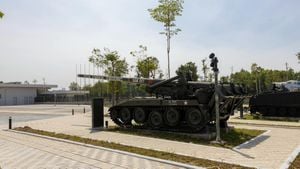The Taliban's recent actions since regaining control of Afghanistan have sparked global concern, particularly around education and human rights. Their regime, marked by strict interpretations of Islamic law, reflects broad ambitions to reshape the education system, aiming to influence young minds and instill ideological principles aligned with their governance.
After the Taliban regained power in August 2021, the Taliban’s leaders wasted no time asserting their influence, immediately suspending education for girls beyond the sixth grade and taking steps to expand religious seminaries—or madrasas—which have seen their numbers grow significantly. This shift toward Islamic education is coupled with corporal punishment, which the regime has reintroduced as part of their educational approach.
The educational policies initiated by the Taliban set the stage for their ideology to permeate Afghan society downward from the classroom. By pushing for ideological indoctrination through revised curricula and textbooks, they intend to override the advances made under previous administrations, where educational reforms focused on inclusivity, personal growth, and non-violence principles.
One of the key changes implemented by the Taliban is the revision of curricula from grades 1-12 to eliminate subjects perceived as counter to their interpretation of Islam. Educational policy scholar Enayat Nasir noted how this bears resemblance to the tactics of Soviet-era policies when textbooks were employed to impose ideological conformity. The Taliban's curriculum revisions reflect their totalitarian tendencies, silencing dissent and promoting obedience to fundamentalist views.
These educational reforms mean erasing significant portions of content from textbooks, and even banning visuals, including illustrations of humans and animals, due to their beliefs about the sanctity of creation. This exclusion of human representation creates sterile learning environments devoid of creativity, limiting students' capacity for imagination and expression.
For example, subjects such as formal arts and civil education are stripped away, emphasizing Islamic education instead. Human rights topics, discussions about equal rights, and democracy are all omitted, reflecting the Taliban's aim to reengineer societal norms where their authority remains undisputed. Students are also subjected to 'emirate studies,' glorifying the Taliban and their past victories, aimed at cultivating loyalty among the youth.
Meanwhile, Afghan students face dire consequences due to the Taliban's rigid strategies. The prior education system—developed after the fall of the Taliban regime—focused on constructive growth and modernization, but these strategies are now glaringly under threat. The shift back to extremist education models generates fears of indoctrinated youth supporting extremist ideologies, perpetuating cycles of violence akin to those witnessed during the Taliban's rule from the late 1990s.
Adding to the despair is the Taliban's focus on punishing unruly behavior with strict corporal measures, fostering environments of fear rather than curiosity or inquiry. Analysts point out the concerning rise of corporal punishment reports within schools, where educators are now being obliged to pass religious tests to maintain employment. This creates environments where compliance supersedes creativity and free thought, qualities imperative for societal development and progress.
Beyond the immediate impacts on students, these actions have drawn responses from international communities frustrated by the silence on girls' education. Humanitarian organizations are struggling to provide assistance—infighting within Afghanistan and recognition troubles exacerbate the challenges of getting aid to those who need it most.
Compounding these educational challenges are burgeoning geopolitical dynamics impacting Afghanistan's international relations. For example, Russia's decision to remove the Taliban from its list of terrorist organizations reflects shifting strategies and contentions entrenched within Afghanistan. Following years of conflict, such shifts can influence the Taliban's alignment with various international players amid increasing scrutiny of their regime.
Despite this potential for increased foreign cooperation, Russia remains quick to critique Western nations' role, particularly about freezing Afghanistan’s assets. The conflicting perceptions of how to address the approaching humanitarian crisis complicate the Taliban’s acceptance internationally, even as it seeks to legitimize its authority.
The broader regional dynamics also include Iran, which has cautiously engaged with the Taliban. Although Iran has not formally recognized the Taliban's government, it has framed its approach through pragmatic lenses, establishing economic corridors and cooperative frameworks to bolster trade. While Tehran's intentions prioritize national interests, the presence of 3.8 to 5 million Afghans within Iran's borders adds layers of complexity, particularly as both nations grapple with border security and resource-sharing dilemmas.
Although both Iran and Afghanistan share mutual interests, their historical grievances often clash, centering around migrational pressures and water disputes concerning the Helmand River, which poses challenges to bilateral cooperation.
With civilian life hanging precariously balanced, many Afghans are clinging to the remnants of hope, hoping for reform and international pressure to yield broader changes. Their voices resonate faintly amid muted metrics of authoritarian rule, igniting fears for future generations.
While the Taliban's grip on the education system reflects their rigidity and commitment to rigid ideologies, the crux of Afghanistan's challenges lies far beyond the classroom. Addressing humanitarian suffering, resolving geopolitical tensions, ensuring cross-border stability, and safeguarding educational opportunities remain pressing needs. These intersecting crises warrant attention, highlighting the urgency of cooperative action to create pathways toward stability, comprehension, and the revival of Afghan society amid the clutches of despair cultivated over years of division.



